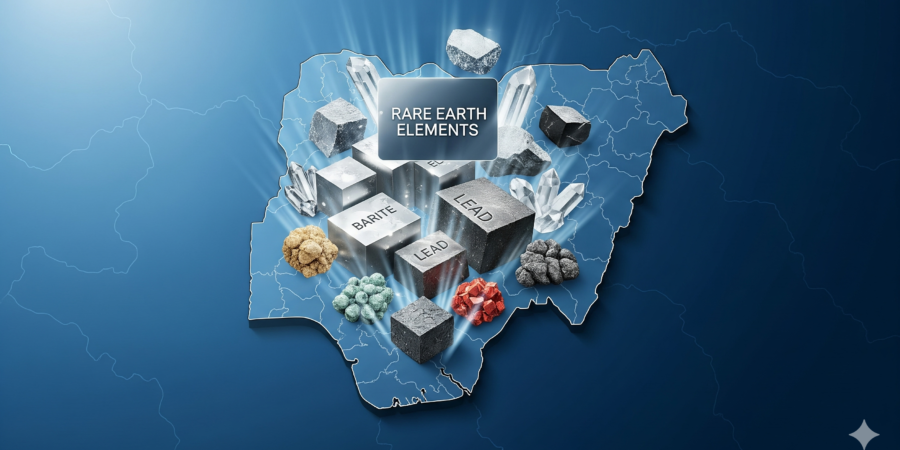Global investors are increasingly looking beyond traditional gold and oil plays to diversify their portfolios. In Nigeria, rare earths, lead, and industrial minerals represent a multi-billion-dollar opportunity that remains largely untapped. From powering electric vehicles to supplying raw materials for global manufacturing, Nigeria’s diverse mineral base is fast becoming a hotspot for forward-thinking investors.
This guide will walk you through the unique opportunities in these sectors, the demand drivers, and how to strategically position yourself for success.
Why Rare Earths, Lead, and Industrial Minerals Matter Globally
- Rare Earth Elements (REEs):
- Essential for electric vehicles, wind turbines, smartphones, and defense technologies.
- Global demand is rising as clean energy transitions accelerate.
- Lead:
- Key input for car batteries, solar power storage, and construction.
- Nigeria is one of Africa’s largest lead producers, yet it is underutilized.
- Industrial Minerals (e.g., baryte, limestone, gypsum, kaolin):
- Backbone of industries such as cement, oil and gas drilling, ceramics, paints, and pharmaceuticals.
- Growing local and regional demand offers long-term market stability.
Nigeria’s Strategic Advantages
- Abundant reserves: Nigeria’s underexplored basins hold vast deposits of REEs, lead, and industrial minerals.
- Low entry costs: Compared to developed markets, exploration and operational costs are significantly lower.
- Growing domestic demand: Nigeria’s population of 220M+ fuels infrastructure growth, manufacturing, and industrial use.
- Export potential: Rising demand from Europe, Asia, and North America makes Nigeria a potential global supplier.
Key Investment Opportunities
1. Rare Earth Mining & Processing
- Early-stage investments in exploration projects with potential for high returns.
- Partnerships with local license holders for processing plants.
2. Lead Mining & Export
- Establishing medium-scale mining operations in lead-rich states such as Ebonyi, Benue, and Niger.
- Export markets for refined lead are expanding.
3. Industrial Minerals Supply Chain
- Setting up processing plants for baryte, gypsum, and limestone to support oil & gas, construction, and cement industries.
- Opportunities for SMEs and larger companies alike.
Risk Factors and How to Mitigate Them
- Regulatory Compliance: Navigate licensing and environmental standards.
- Community Relations: Ensure sustainable engagement and social investment.
- Due Diligence: Verify titles, partners, and reserves before committing capital.
This is where professional consultancy and structured entry strategies make the difference between success and costly mistakes.
How We Support Investors
At the Nigerian Mineral Exchange (NME), we provide:
- The Nigerian Mining Investment Navigator – a bespoke service to match investors with vetted opportunities, licenses, and partners.
- Mining & Mineral Trading Company Setup (Nigeria) – end-to-end guidance on company formation, compliance, and operational strategy.
- Knowledge Resources – such as our ebook Unlocking Nigeria’s Mineral Wealth: 113 Lucrative Business Ideas to inspire your portfolio planning.
We work with a limited number of investors each quarter to ensure focus and success. Secure your consultation slot today.
📘 The Nigeria Mineral Trading & Licensing Blueprint (2026 Edition)
If you are serious about buying, selling, or trading minerals legally in Nigeria, you cannot afford to rely on guesswork, outdated advice, or hearsay. The regulatory environment is tightening fast, and costly mistakes now lead to permit denials, seizures, or permanent blacklisting.
That’s why we created The Nigeria Mineral Trading & Licensing Blueprint: 2026 Guide to Buying Center Licenses & Purchase Permits — an updated, clear, step-by-step, insider guide that shows you exactly how to obtain Mineral Buying Center Certificates, Purchase & Possession Permits, and related approvals without delays or regulatory traps.
This guide distills real regulatory procedures for 2026, compliance requirements, and practical insights used by serious operators — saving you months of confusion, wasted money, and avoidable risk.
If mineral trading is part of your business future, this blueprint is not optional — it’s protection.
Conclusion
Nigeria’s rare earths, lead, and industrial minerals are still at the early stages of global recognition – meaning first movers stand to gain the most. With rising global demand and abundant reserves, the time to enter is now.
Your next step? Align with trusted advisors, verify opportunities, and leverage Nigeria’s competitive edge to build a profitable and sustainable mining investment portfolio.
READ ALSO:





Leave a Reply